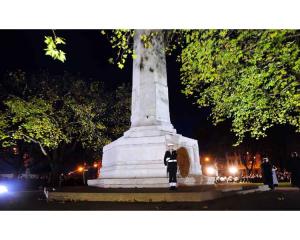Tens of thousands of people - many wearing bright red poppies - yesterday marked the 96th anniversary of the landing of New Zealand and Australian soldiers at Gallipoli.
Old soldiers resplendent with gleaming medals and freshly-shined shoes marched with the precision and discipline of years ago, under the approving gaze of grey-haired veterans through to the ever-growing numbers of young.
More than 800 people gathered in Alexandra, upwards of 500 packed the Queenstown Memorial Hall, about 500 attended in Wanaka, and more than 300 people were present at the services in Oamaru and Balclutha.
Thousands attended dawn ceremonies in Auckland, Wellington and Christchurch.
In Dunedin, the uniforms of army, navy and air force personnel mixed with those from the Salvation Army, Scouts, Police and Red Cross before marching behind the City of Dunedin Pipe Band at 6.15am.
Delivering this year's Dunedin Anzac address, Lieutenant-colonel Roger McElwain, commanding officer of the 4th Otago Southland Battalion Group, said there were only a few days in New Zealand history which defined who we are.
"Anzac Day is one of those days," he said.
"It is a day that defines our relationship to one another and to the rest of the world and is a day that reinforces our sense of identity, belonging, and pride as a nation. It is a national day where we honour those who have served New Zealand through their military service, in particular those who have lost their lives in that service.
"Anzac Day is a time of remembrance that continues to increase in stature every year."
Lt-col McElwain said the day meant different things for each New Zealander, and for him it was the playing of the Last Post , which reminded him of the sacrifices others made so "I can be here to listen".
He paid tribute to New Zealanders whenever and wherever they have fought with distinction: from the battlefields of World War 1 and 2 to Korea, Malaya, Vietnam, Bosnia, East Timor, Afghanistan and the Solomons.
"I would like in part to acknowledge the men and woman of this region, their service and their sacrifices. Travel around Otago and Dunedin and you will see monuments, memorial halls and gateways with lists of names inscribed in stone. Dunedin and every small town in Otago has its monuments with its long list of names."
He said many of these communities lost their "best and brightest" in battles overseas, and they were lost to New Zealand as a country: "What a tragedy".
Those who gave their lives for their country were honourable and courageous, two attributes which could make New Zealand a better country today, he said.
"Everyday I read the paper, I read about actions and deeds that are not honourable and courageous."
Lt-col McElwain said in the past nine months he has had to oversee the return and burial of "two of my soldiers" - Lieutenant Tim O'Donnell, who was killed in Afghanistan last year, and Private Kirifi Mila, earlier this year.
"Both men were doing their duty with honour and courage."
RSA president Alan Goding read the Anzac dedication, with the crowd joining him with "We will remember them".
Following the Last Post and the Australian and New Zealand national anthems, the service concluded with people laying their poppies at the foot of the cenotaph.



